- Home
- Nevil Shute
The Breaking Wave Page 3
The Breaking Wave Read online
Page 3
My father had been experimenting with spreading super-phosphate from the air on paddocks that were too rough and stony to make spreading it from trucks a possibility, and this again had increased the carrying capacity of the land. Two Tiger Moths had done the work efficiently and well, and he was going to have more paddocks treated in this way in the coming summer. He had built new shearers’ quarters soon after I had left which I had never seen, of course, and in the last year he had remodelled the shearing shed and had installed new machinery throughout. He had built four new weatherboard houses for the station hands to replace the last of the older, two-roomed shacks of my grandfather’s time, and a couple of years ago he had put up a considerable power station with a diesel engine of no less than sixty horsepower to provide electricity not only for our house but for each of the eleven houses on the property.
My father was only able to give me the bare outline of all these activities during tea, and my mother, of course, wanted to know all about my life in London, so that we had much to talk about. My mother seemed much brighter when she had had her tea, and announced her intention of getting up for dinner, which I thought was a good thing and better for her than lying in bed thinking about the dead parlourmaid upstairs. It was arranged that my father would drive me round the property for a couple of hours in the Land Rover before dinner while my mother got up and dressed and organised the dinner with Annie our old cook and Mrs. Plowden, who was usually brought in to help with the washing up in times of domestic crisis.
We finished tea and put the cups and plates back on the tea trolley, which my father proceeded to wheel out through the big, galleried central hall to the pantry. I stayed for a moment with my mother before going out to carry my suitcases up to my bedroom on the upper floor.
My mother said, “I think you’re wrong about Jessie, Alan.”
“In what way?” I asked. “Wrong about what?”
“About her being married,” said my mother quietly, “I’m sure she wasn’t.”
I was silent, because it’s a difficult subject for a bachelor to dispute with a woman of my mother’s age. “Did she ever say she wasn’t?” I asked at last.
My mother shook her head. “She never said anything at all about her own affairs. But I’m quite sure she wasn’t married.”
TWO
As old age had crept upon my father and mother they had reduced the scale of their expenditure upon themselves to quite a small proportion of their net income. They never had kept racehorses as many of our neighbours do, and they had outgrown the pleasures of spending money. They got a book each month through the Book Society and they bought a few gramophone records when they were in Melbourne, but with increasing years and infirmity they got more pleasure out of old things than new, out of old books that they had read fifteen or twenty years before and turned back to now with pleasure, out of old gramophone records, out of furniture that they had bought thirty years ago when they took over Coombargana.
Helen’s allowance and my own had absorbed a good slice of their net income after taxation, which in recent years had fluctuated between twenty and thirty thousand pounds a year. Much of the rest had been saved and invested prudently to provide for death duties on an estate which might well be assessed at a quarter of a million pounds upon my father’s death, but this cash reserve was now adequate for any calls that were likely to be made on it. In other countries and in other circles a prosperity such as ours might be accompanied by wild parties in the city, with a nude girl in a bath of champagne in the middle of the dinner table and a dozen crashed motor cars next morning. In the Western District things had never been like that; perhaps an agricultural prosperity doesn’t go that way. Certainly Australian wool producers, those who survived the hard times of the ’thirties when wool was down to a shilling a pound, got such an economic fright as would keep them in the straight and narrow path for the rest of their lives. I can vouch for it that at Coombargana and all the other stations that I know the money made seems to be spent prudently and well.
My father’s great interest was in the property, and all his spare money was now going into improvements. Wherever I looked as we drove round in the Land Rover there was something new, new stockyards, new spray sheep dips, new vehicles, new pumps, new generators, new houses, new fences, new windmills, and new dams. In the hard times before the second war, when I was a boy at Coombargana, much of this expenditure would have been classed as rank extravagance, but times had changed and my father had had the wit to change with them. Labour costs had trebled since the ’thirties and the output of the property had doubled, so that any machine that would save an hour of a man’s time was now a good machine.
We went in to the long shearing shed, now empty and swept clean, of course, for the shearing was over and the shed would remain unused till next year. He showed me how he had rearranged the stands and the tables and the bins, and the new machinery. He had made a job of it all right; I could visualise the production line, so to speak, when this place was going full blast and sheep were passing through at the rate of three hundred an hour. I was keenly interested in all that he had done, for this was my job from now on, but the dead parlourmaid was still the background of my mind.
We rested for a few minutes in the long, cool aisle of the shed, leaning against a table, looking round. “Mother doesn’t seem to think much of my idea that the girl was married,” I said.
“She doesn’t?”
I shook my head.
“I’d never thought of her as a married woman, myself,” my father remarked. “She might have been, of course.”
“How old was she?”
“Twenty-eight or thirty, I should say. It’s difficult to judge.”
“Harry said she never took a holiday.”
“I don’t think she did. I think she went into Ballarat once or twice for shopping, but apart from that I don’t think she left the place the whole time she was here.”
I wrinkled my brows. “What did she do on her days off?”
He thought for a minute. “I think she was interested in the property,” he said. “She used to go out with Jim Plowden and the rabbit pack. I think she liked the dogs. She liked shooting, too. I never had much to do with her outside; she kept her place, you know. The men say that she was a very fine shot at rabbits, either with a gun or a rifle. They say she never seemed to miss.” He paused. “I’ve been wondering if she was a farmer’s daughter perhaps, back at home.”
I nodded. “You don’t know what part of England she came from?”
“I don’t,” he said. “Annie thinks she came from London, but I don’t think she really knows.”
“That doesn’t line up with her being a farmer’s daughter.”
“I know.”
We sat silent for a minute. Then I glanced at him, and said, “The coroner’s coming here tomorrow morning, with the police?”
He nodded. “They’ve got to give a certificate for burial. There’ll have to be an inquest, of course.”
“Bit awkward, if we don’t know who she was.”
He bit his lip. “I know,” he said. I glanced at him, and there was an old man’s tremor moving his head, the first time I had seen it. “It makes us look—well, careless.”
“I wouldn’t worry about that, Dad,” I said. “It’s not as if she was a young girl that you were responsible for. She was a grown woman.”
His hand moved to his chin, as if to stop the tremor. “I know,” he replied. “But it looks bad all the same. As if we didn’t care.”
He turned to me. “It’s a very good thing for your mother that you’ve come home, Alan. It’s going to take her mind off it. Be with her as much as you can till the funeral is over. Tell her about England—anything.”
“She’s going to miss her, is she?”
He nodded. “She’s going to miss her a great deal. When a woman’s getting on in years and not very well, it’s a great comfort to have a girl about the place who’s sensible and responsible. She’s a great
loss to your mother, Alan.”
I nodded slowly. “Mother was fond of her?”
“I think so. Yes, I think she was,” my father said. “The girl kept her place, but she used to think ahead and do things for your mother before she thought of asking for them, if you understand what I mean. She was very thoughtful for your mother in that way.”
If she had been thoughtful for my mother it seemed to indicate that she had liked being at Coombargana; indeed, everything that I had heard seemed to point that way. She had never even bothered to take the holidays that were due to her. Then why had she taken her own life? I glanced at my father. “What do you think about this theory of Mother’s, that it was an accident?” I asked. “I didn’t want to say too much in front of Mother. Would you say she was a suicidal type?”
He said, “I simply don’t know, Alan. I don’t know what a suicidal type looks like. To me she was just an ordinary, decent girl, not very good-looking. I wouldn’t have expected her to commit suicide—I’d have said she was too level-headed. But who’s to say?”
“Do you think it was an accident, Dad?” I asked. “I’ve never heard of anyone taking an overdose of sleeping tablets by mistake. I mean, you’ve got to eat such a lot, and gulp down such a lot of water. How many does the doctor say she took?”
“More than twenty.”
“Well, surely to God, that couldn’t have been a mistake. You can’t go on taking tablet after tablet till you’ve taken twenty, by mistake. If it had been one, or even two, it might be possible. But not twenty.”
“If it was deliberate,” my father said, “she wouldn’t have left two tablets in the bottle, would she? She’d have taken the lot, to make sure.”
There was a pause. “I can’t think it was an accident,” I said at last. “I’m sorry, Dad, but I should say it was deliberate.”
He stood up, and I was deeply sorry for him, for he looked so old. “Well, don’t tell your mother that,” he said. “It’s better if she thinks it was an accident. I’m hoping that we’ll get the coroner to see it that way in the morning. If it was deliberate we’ll probably never know the reason, and there’s no sense in stirring up trouble.”
We left the shed and got back into the Land Rover and went on with our tour around the property. In the evening light we came to his trout hatchery by the river, a series of little pools with water running through controlled by little sluices from the river, overhung by weeping willow trees. When I had written to tell them that I would be coming home next spring my father had had this disused hatchery put in order and commenced to breed up about a thousand little fish with which to re-stock the river against my return; he intended to keep them a few months longer and then discharge them into the main stream. Next year the fishing should be very good indeed.
We paused by the pools, in the rippling sound of running water, and he began to ask me questions about my time in England. I had taken my degree in Law at Oxford, but I hadn’t enjoyed it much. “It was a bit like Rip van Winkle, Dad,” I said. “I was so much older than the others, and things had changed so. It would have been different if I’d gone back straight after the war, in 1945 or ’46, when there were other Service people up. There was no one there like me in 1948, or hardly anybody, and nobody at all when I went down in 1950. They were all boys straight from school on government grants. The people I got along with best were the young dons.” I paused. “I want to get one or two of them out here on a visit, but it’s difficult because they’re all so hard up.”
He nodded. “That’s always a difficulty. But you never can get people to come out from England on a visit. It’s not only the money.”
I went on to tell him about my time in chambers, in Lincoln’s Inn. “I don’t know that I haven’t wasted my time,” I said quietly at last. “I don’t know that being called to the Bar is going to help me much in running Coombargana.”
He smiled. “Do you think you’ll want to go back and live in England?” he asked.
“I don’t think so,” I said. “I think I’ve got that out of my system. I’d like to go back again some day for fun, say in about ten years’ time, and see how it’s all getting on. But I won’t want to live there again. I don’t think so.”
“Not like Helen?”
“No.”
“What’s Laurence really like?” my father asked. He had never met him, for with their increasing age my mother and father had not felt equal to leaving Coombargana to travel to England. It was one of my secret irritations with my sister that she had not thought fit to bring her husband out to Australia on a visit to let Dad and Mum meet him, though perhaps it was better so.
“He’s all right,” I said. “I’ve not got a lot in common with him, Dad, and I don’t think you would have.” My father had served all through the first war in Gallipoli and France, and had spent three years of the second war organising truck transport in the heat and sweat of the Northern Territory when he was over sixty years of age, while Laurence had had trouble with his health and had served his war with the B.B.C. “There’s nothing wrong with him. He’s getting very well known as a dramatic critic—people think a lot of him.” I glanced at my father. “I’m not sure that he’s not a bit of a passenger in this world, but he probably thinks that of us.”
“He’s making her a good husband, is he? Not a lot of other women, or not more than a reasonable number?” My father grinned.
I laughed with him. “I don’t think there’s any trouble of that sort.” There wasn’t likely to be, either, because Helen has quite a lot of character and she kept control of her own money. Laurence wasn’t the type to sacrifice all for love.
“What about you, Alan?” my father asked. “Did you ever think of getting married?”
I shook my head.
“You ought to think about it,” he said. “You’re getting on, you know. Thirty-nine, isn’t it?”
I nodded. “It’s never happened to come my way.”
“You ought to think about it,” he repeated. “It’s going to be mighty lonely if you try and carry on this place alone after our time.”
“It’s not so easy when you’re a cripple,” I said. “It needs special qualities in a girl to settle down married to a chap that’s got no feet.”
“Well, think it over,” he said irresolutely. And then he said, “You never thought of flying again, I suppose?”
“As a matter of fact, I did,” I told him. “Not in Typhoons, of course. I did quite a lot of flying at the London Aeroplane Club, at Panshanger, on Tiger Moths and Austers. I didn’t tell you in the letters because I was afraid it might worry Mother.”
“Are you going on with it here?”
“I doubt it,” I said. “I just wanted to show myself that I wasn’t afraid of it and that I could do it still, even with dummy feet. I did about a hundred hours in all. But I don’t want to carry on with it, unless there was some object. Which there isn’t now.”
He smiled. “What was it like when you got into the machine for the first time?” he asked with interest. “Were you scared?”
“A bit,” I said. “About as much as on my first solo. But of course, one knew it was dead safe in a pipsqueak thing like that.”
We left the pools of the trout hatchery and walked slowly back to the Land Rover. “Your mother’s been concocting an exceptional dinner for you all day,” my father said. “Do you want to change?”
“She’d like it, wouldn’t she?” I asked. “What do you usually do?”
“I generally put on a dinner jacket in the winter, when it’s dark,” my father said. “In summer when one may want to go out afterwards I usually change into a suit.”
“I’ve got a dinner jacket in my bag,” I said. “The shirt’s probably a bit tatty after travelling round the world. Let’s change. Mother’d like it.”
At the house we found my mother in the drawing-room seated before the log fire, wearing a long black evening dress with a shawl round her shoulders. We stood warming ourselves, for the evening was
turning chilly, and drinking a pink gin while we chatted about London and about Helen; then I went up to my room to change. In my bedroom somebody had lit a fire and left a huge basket of gum tree logs, scenting the air with the fragrance of the burning eucalypt. Somebody, perhaps old Annie, had unpacked one suitcase and had laid out my evening clothes upon the bed.
It struck me as I unpacked my other suitcase in my old, familiar room, savouring all my old belongings, that I would be the only person sleeping on the upper floor of the main house that night. My father and mother, who had had the bedroom, dressing-room, and bathroom next to mine, now slept on the ground floor and their bedroom was now the billiard room. On the other side of the corridor to their room was the corner room that had been Helen’s and was now a spare room, and next to that and separated by the second bathroom was the guest bedroom, empty tonight, of course. Beside my room there was another bathroom, and opening from that was Bill’s room, very seldom used now. Bill had been killed in Normandy in the spring of 1944; by the time I got back to Coombargana my father and mother had taken all Bill’s possessions and pictures out and had refurnished and redecorated the room as a second guest room, thinking perhaps that too intimate a reminder of Bill and the war in Europe would have been bad for me. Nothing of Bill remained there now, but they had forgotten the bathroom. Since 1946 I had never sat in that bath without glancing at the door into Bill’s room with the thought that it would open and he would come striding in, seventeen or eighteen years old, with little or no clothes on.

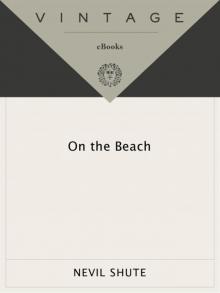 On the Beach
On the Beach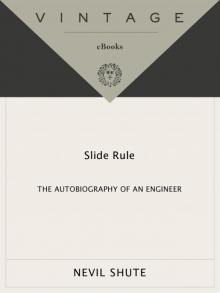 Slide Rule
Slide Rule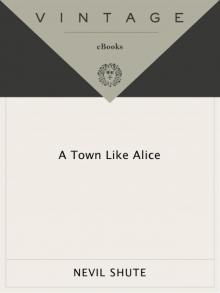 A Town Like Alice
A Town Like Alice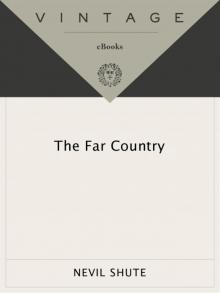 The Far Country
The Far Country Pied Piper
Pied Piper Round the Bend
Round the Bend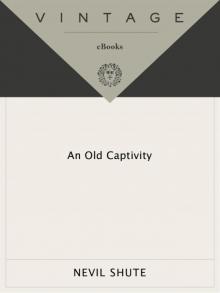 An Old Captivity
An Old Captivity Mysterious Aviator
Mysterious Aviator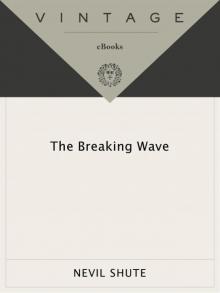 The Breaking Wave
The Breaking Wave Marazan
Marazan Lonely Road
Lonely Road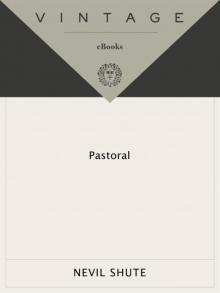 Pastoral
Pastoral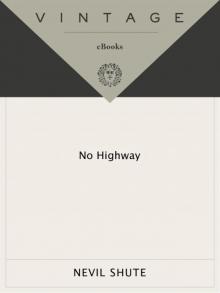 No Highway
No Highway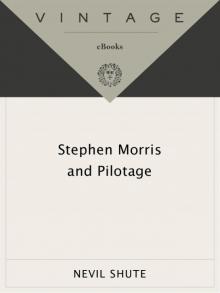 Stephen Morris and Pilotage
Stephen Morris and Pilotage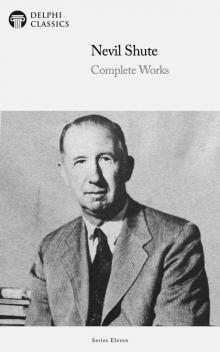 Complete Works of Nevil Shute
Complete Works of Nevil Shute Most Secret
Most Secret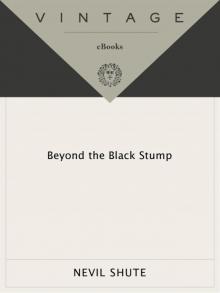 Beyond the Black Stump
Beyond the Black Stump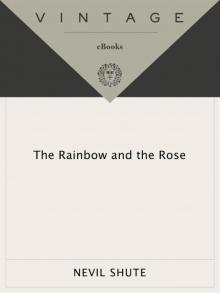 The Rainbow and the Rose
The Rainbow and the Rose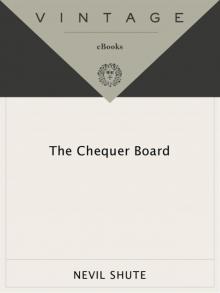 The Chequer Board
The Chequer Board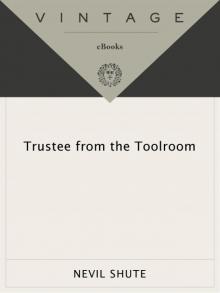 Trustee From the Toolroom
Trustee From the Toolroom Ordeal
Ordeal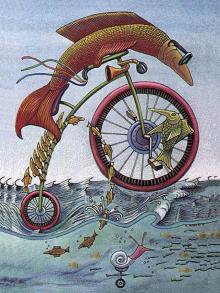 Stephen Morris
Stephen Morris